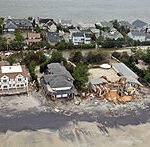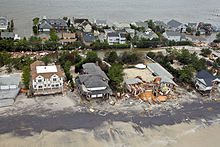 “It’s like a war zone.”I’ve heard this statement many times as I’ve walked the storm-damaged streets around my home in the weeks after Superstorm Sandy made landfall. Every time I heard it, I would nod politely and say a silent prayer of gratitude that, in fact, it isn’t a war zone, writes Jamie Manson. “I haven’t been to a war zone, but I think have watched enough PBS and read enough of The New York Times to get a sense of the sufferings that characterizes one: widespread destruction and debris, a scarcity of water and food, a critical need for basic supplies and medical assistance, great numbers of displaced people or refugees.”
“It’s like a war zone.”I’ve heard this statement many times as I’ve walked the storm-damaged streets around my home in the weeks after Superstorm Sandy made landfall. Every time I heard it, I would nod politely and say a silent prayer of gratitude that, in fact, it isn’t a war zone, writes Jamie Manson. “I haven’t been to a war zone, but I think have watched enough PBS and read enough of The New York Times to get a sense of the sufferings that characterizes one: widespread destruction and debris, a scarcity of water and food, a critical need for basic supplies and medical assistance, great numbers of displaced people or refugees.”
Yes, for 10 days we had no water, and even when the faucets began to flow again, the water was not potable for four days. But, according to the World Health Organization, more than 1 billion people do not have access to safe drinking water.
And while the port-a-potties were unsightly and unpleasant to use, the WHO also reports that 2.5 billion people — that’s more than a third of the world’s population — lack access to an adequate latrine.
Piles of debris still line the streets, but gradually, they are being carted off to transfer stations. According to the United Nations, almost one in six human beings live in slums, many of which resemble the heaps of debris that line our streets.
While tens of thousands of people in the tri-state area were displaced for weeks almost three years after the devastating earthquake that displaced 1 million Haitians, 370,000 people still live in tents in that country without electricity and with little protection against the violence that rages in these encampments.
Perhaps we must be grateful most of all that the suffering we have endured came from an act of nature and not at the hands of human violence.
During the peak of the storm the night of Oct. 29, we continually saw sudden bursts of light in the sky. What we thought was lightning we later learned was the explosion of transformers that sat atop nearby power lines. As I have watched the scenes of missiles being launched over Israel and Gaza, I imagine how much more terrifying those streaks of light in the sky are for children and families who are huddled in shelters, fearing destruction and harm even more terrifying than what comes from winds and flood.
Every day in the news, there is another troubling story about the 2 million Syrians who have become refugees. The latest report from Save the Children warns that 200,000 Syrian children are at risk from freezing temperatures and a lack of adequate shelter, clothing and bedding. Here in Long Beach, there are so many clothing donations that those seeking to donate had to be turned away one week after the storm.
Many of us have experienced over the last month life the way so many human beings around the globe experience daily. Some folks were hit harder than others; some will be able to recover more quickly than others. But for most of us, the suffering, the deprivation, the displacement was or will be temporary.
I say all of this not to minimize the suffering of those in my community. The loss of home is a profound trauma, and days, if not weeks, without heat, water or sewer is more than enough hardship for any person. I write this with the hope that this experience might heighten our awareness of the suffering not only of our neighbors, but of the countless, unnamed women, men and children who suffer the effects of poverty and war throughout our world.
She concludes…
As we rebuild our homes and restore our lives, perhaps we will recognize this experience as an invitation into a deeper solidarity with those who may never have access to clean water, with the families who will be displaced for the better part of their lives, and with those innocent victims who truly live in war zones.
Tags: Disasters, ncr, Poverty Analysis, Solidarity

